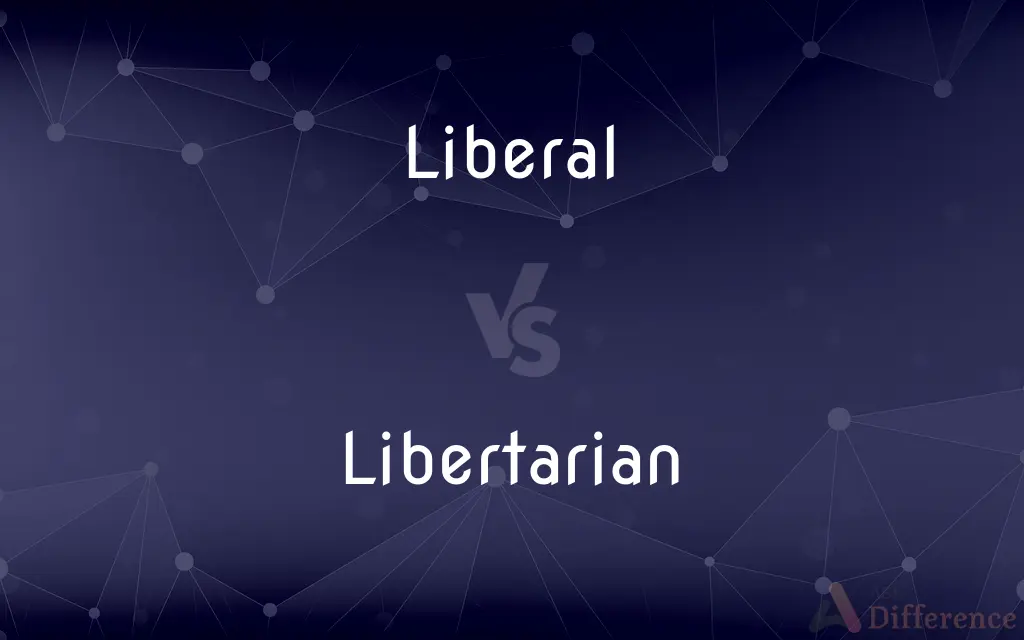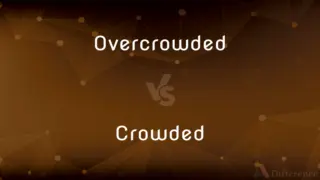Liberal vs. Libertarian — What's the Difference?
By Fiza Rafique & Maham Liaqat — Updated on March 19, 2024
Liberalism emphasizes social equality and government intervention in the economy, while libertarianism prioritizes individual freedom and minimal government.

Difference Between Liberal and Libertarian
Table of Contents
ADVERTISEMENT
Key Differences
Liberalism, particularly in its modern American context, advocates for social equality, expansive civil rights, and a significant role for government in regulating the economy and providing social services. Liberals typically support policies that address economic disparities, environmental protection, and healthcare for all. In contrast, libertarianism emphasizes individual liberty, free markets, and a highly limited government role beyond protecting individual rights. Libertarians advocate for minimal state intervention in personal lives and economic activities, arguing that this maximizes freedom and prosperity.
Liberals often see government intervention as necessary to correct market failures, protect the environment, and ensure that all citizens have access to basic necessities like healthcare and education. They may support progressive taxation as a tool for redistributing wealth. On the other hand, libertarians argue that government interventions in the economy and personal freedoms often do more harm than good, leading to inefficiencies and a loss of personal liberties. They champion a laissez-faire economic approach and a legal system focused solely on protecting individual rights from fraud, theft, and coercion.
While both ideologies value freedom, they prioritize different aspects of it. Liberals focus on "positive liberties" or the freedom to achieve potential through collective action and support structures, such as social safety nets. Libertarians prioritize "negative liberties," emphasizing freedom from external constraints, particularly from government interventions.
In social policy, liberals often support government involvement in promoting social justice and inclusivity, such as affirmative action and marriage equality. Libertarians, while generally supportive of personal freedoms, may object to government-imposed mandates that they view as infringing on individual rights, even if the goal is to promote equality.
The divide between liberalism and libertarianism highlights a fundamental debate about the role of government in society and the nature of freedom, with liberals advocating for a more active government to ensure equality and libertarians calling for minimal state interference to maximize individual liberty.
ADVERTISEMENT
Comparison Chart
Economic Policy
Supports government intervention to promote equality and address market failures
Advocates for free markets and minimal government intervention
Social Policy
Favors government action to achieve social justice and protect civil rights
Emphasizes individual choice and minimal state interference in personal matters
View on Government
Sees government as a tool to correct inequalities and provide social services
Views government as a potential threat to freedom, to be kept as limited as possible
Key Values
Social equality, environmental protection, healthcare for all
Individual liberty, property rights, free market
Approach to Freedom
Prioritizes positive liberties (freedom to achieve potential)
Prioritizes negative liberties (freedom from external constraints)
Compare with Definitions
Liberal
Advocates for social and economic equality, often through government intervention.
Liberals typically support universal healthcare systems.
Libertarian
Champions individual freedom and autonomy, with a minimal role for government.
Libertarians advocate for the decriminalization of drug use.
Liberal
Supports environmental regulations and climate change initiatives.
Liberals advocate for policies like the Green New Deal.
Libertarian
Sees limited government as essential to protecting personal and economic freedoms.
Libertarians frequently oppose surveillance laws and other privacy intrusions.
Liberal
Emphasizes the protection and expansion of civil rights.
Liberals often champion marriage equality and voting rights reforms.
Libertarian
Supports free-market capitalism as the most efficient economic system.
Libertarians oppose most forms of economic regulation and subsidies.
Liberal
May advocate for progressive taxation to redistribute wealth.
Liberals often support higher taxes on the wealthy to fund social programs.
Libertarian
Emphasizes property rights and voluntary associations.
Libertarians argue for the right to use private property without excessive government restrictions.
Liberal
Believes in a robust social safety net.
Liberals push for extensive unemployment benefits and food assistance programs.
Libertarian
Advocates for a non-interventionist foreign policy.
Libertarians generally oppose military interventions and favor free trade.
Liberal
Favoring reform, open to new ideas, and tolerant of the ideas and behavior of others; not bound by traditional thinking; broad-minded.
Libertarian
An adherent of libertarianism
Libertarian philosophy
Liberal
Of, relating to, or characteristic of liberalism.
Libertarian
A person who believes in free will.
Liberal
Liberal Of, designating, or characteristic of a political party founded on or associated with principles of social and political liberalism, especially in Great Britain, Canada, and the United States.
Libertarian
One who advocates maximizing individual rights and minimizing the role of the state.
Liberal
Tending to give freely; generous
A liberal benefactor.
Libertarian
One who believes in free will.
Liberal
Generous in amount; ample
A liberal serving of potatoes.
Libertarian
One who advocates liberty, either generally or in relation to a specific issue.
Liberal
Not strict or literal; loose or approximate
A liberal translation.
Libertarian
A believer in right-libertarianism, a political doctrine that emphasizes individual liberty and a lack of governmental regulation, intervention, and oversight both in matters of the economy (‘free market’) and in personal behavior where no one’s rights are being violated or threatened.
Liberal
Of, relating to, or based on the traditional arts and sciences of a college or university curriculum
A liberal education.
Libertarian
A left-libertarian, an antiauthoritarian believer in both individual freedom and social justice (social equality and mutual aid).
Liberal
(Archaic) Permissible or appropriate for a person of free birth; befitting a lady or gentleman.
Libertarian
(philosophy) A believer in the freedom of thinking beings to choose their own destiny, i.e. a believer in free will as opposed to those who believe the future is predetermined.
Liberal
(Obsolete) Morally unrestrained; licentious.
Libertarian
Having the beliefs of libertarians; having a relative tendency towards liberty.
He has libertarian views.
A libertarian capitalist.
Liberal
A person with liberal ideas or opinions.
Libertarian
(dated) Relating to liberty, or to the doctrine of free will, as opposed to the doctrine of necessity.
Liberal
Liberal A member of a Liberal political party.
Libertarian
Pertaining to liberty, or to the doctrine of free will, as opposed to the doctrine of necessity.
Liberal
Pertaining to those arts and sciences the study of which is considered to provide general knowledge, as opposed to vocational/occupational, technical or mechanical training.
He had a full education studying the liberal arts.
Libertarian
One who holds to the doctrine of free will.
Liberal
Generous; permitting liberty; willing to give unsparingly.
He was liberal with his compliments.
Libertarian
Someone who believes the doctrine of free will
Liberal
Ample, abundant; generous in quantity.
Add a liberal sprinkling of salt.
Liberal
(obsolete) Unrestrained, licentious.
Liberal
Widely open to new ideas, willing to depart from established opinions or conventions; permissive.
Her parents had liberal ideas about child-rearing.
Liberal
(politics) Open to political or social changes and reforms associated with either classical or modern liberalism.
Liberal
One with liberal views, supporting individual liberty (see Wikipedia's article on Liberalism).
Liberal
(US) Someone with progressive or left-wing views; one with a left-wing ideology.
Liberal
A supporter of any of several liberal parties.
Liberal
(UK) One who favors individual voting rights, human and civil rights, and laissez-faire markets also called "classical liberal"; compare libertarian.
Liberal
Free by birth; hence, befitting a freeman or gentleman; refined; noble; independent; free; not servile or mean; as, a liberal ancestry; a liberal spirit; liberal arts or studies.
Liberal
Bestowing in a large and noble way, as a freeman; generous; bounteous; open-handed; as, a liberal giver.
Infinitely good, and of his goodAs liberal and free as infinite.
Liberal
Bestowed in a large way; hence, more than sufficient; abundant; bountiful; ample; profuse; as, a liberal gift; a liberal discharge of matter or of water.
His wealth doth warrant a liberal dower.
Liberal
Not strict or rigorous; not confined or restricted to the literal sense; free; as, a liberal translation of a classic, or a liberal construction of law or of language.
Liberal
Not narrow or contracted in mind; not selfish; enlarged in spirit; catholic.
Liberal
Free to excess; regardless of law or moral restraint; licentious.
Liberal
Not bound by orthodox tenets or established forms in political or religious philosophy; independent in opinion; not conservative; friendly to great freedom in the constitution or administration of government; having tendency toward democratic or republican, as distinguished from monarchical or aristocratic, forms; as, liberal thinkers; liberal Christians; the Liberal party.
I confess I see nothing liberal in this " order of thoughts," as Hobbes elsewhere expresses it.
Liberal
One who favors greater freedom in political or religious matters; an opponent of the established systems; a reformer; in English politics, a member of the Liberal party, so called. Cf. Whig.
Liberal
A person who favors a political philosophy of progress and reform and the protection of civil liberties
Liberal
A person who favors an economic theory of laissez-faire and self-regulating markets
Liberal
Showing or characterized by broad-mindedness;
A broad political stance
Generous and broad sympathies
A liberal newspaper
Tolerant of his opponent's opinions
Liberal
Having political or social views favoring reform and progress
Liberal
Tolerant of change; not bound by authoritarianism, orthodoxy, or tradition
Liberal
Given or giving freely;
Was a big tipper
The bounteous goodness of God
Bountiful compliments
A freehanded host
A handsome allowance
Saturday's child is loving and giving
A liberal backer of the arts
A munificent gift
Her fond and openhanded grandfather
Liberal
Not literal;
A loose interpretation of what she had been told
A free translation of the poem
Common Curiosities
What do liberals and libertarians agree on?
They may find common ground on certain civil liberties, such as freedom of speech and privacy rights, though they often arrive at these positions through different reasoning.
Do libertarians support any government interventions?
Libertarians do support government action in protecting individual rights, enforcing contracts, and safeguarding against fraud and coercion.
How do the two ideologies approach environmental regulations?
Liberals typically support government-led environmental protections, while libertarians might favor market-based solutions or question the extent of human impact on climate change.
What's the liberal stance on education?
Liberals generally support public education and government-funded programs to ensure equal educational opportunities, whereas libertarians might favor privatization and school choice.
Is libertarianism more aligned with traditional conservative or liberal values?
Libertarianism shares conservatives' emphasis on economic freedom but can align with liberals on social issues, making it distinct from traditional left-right classifications.
Can someone be both liberal and libertarian?
While there are significant differences, some individuals might identify with aspects of both ideologies, particularly on issues like civil liberties.
How do liberals and libertarians view healthcare?
Liberals often see healthcare as a universal right requiring government involvement, while libertarians prefer market-based solutions and personal choice.
How do liberals and libertarians view taxes?
Liberals are more likely to support progressive taxation as a means of redistributing wealth, while libertarians often advocate for lower taxes and minimal government spending.
How do these ideologies influence political parties?
In the U.S., liberal ideologies heavily influence the Democratic Party, while libertarian ideas can be found in both major parties but are closely associated with the Libertarian Party.
How do the two ideologies differ on social welfare?
Liberals support welfare programs as a safety net for the disadvantaged, while libertarians may view such programs as infringing on economic freedom and personal responsibility.
Share Your Discovery

Previous Comparison
Overcrowded vs. Crowded
Next Comparison
Feed vs. FodderAuthor Spotlight
Written by
Fiza RafiqueFiza Rafique is a skilled content writer at AskDifference.com, where she meticulously refines and enhances written pieces. Drawing from her vast editorial expertise, Fiza ensures clarity, accuracy, and precision in every article. Passionate about language, she continually seeks to elevate the quality of content for readers worldwide.
Co-written by
Maham Liaqat













































